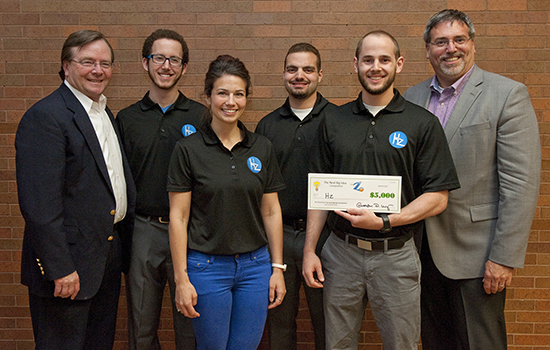Sound recognition system wins business competition
Design promises to improve deaf, hard-of-hearing homeowner experience
Mark Benjamin/NTID
Hz Innovations captured the grand prize at this year’s The Next Big Idea competition. Pictured from left to right: Gerry Buckley, NTID President; students Keith Delk, Chrystal Schlenker, Jason Lee and Greyson Watkins; and Chris Wagner, senior vice president, Business Operations and Marketing, ZVRS.
Greyson Watkins knew that he and his team had the makings of a revolutionary idea that would enhance life for deaf and hard-of-hearing homeowners. To prove it, the all-student team entered their project—Hz Innovations—in “The Next Big Idea” competition at Rochester Institute of Technology’s National Technical Institute for the Deaf—and walked away with the $5,000 grand prize.
The team devised a cutting-edge wireless sound recognition system for deaf and hard-of-hearing homeowners. Sound-capturing units plugged into outlets throughout the home are tied into a single central processing unit, also in the home. When a doorbell rings, smoke alarm chimes or water faucet drips, for example, the unit notifies the homeowner via smart phone, smart watch, tablet or laptop. Virtually any sound deemed important to the homeowner can be recorded and “memorized” by the system during installation.
“I moved into a house and I started noticing all of the important things I was missing,” said Watkins, a fourth-year computer security student from Durham, N.C. “I missed the sounds of my friends knocking on my front door; my washer and dryer are in the basement and I wouldn’t be able to hear the buzzing of the dryer; my food would burn because I would leave the oven on. There are a lot of people out there, including senior citizens, who have similar issues. I just came up with the idea and it took off.”
The one-of-a-kind product—which the team has decided will retail for about $150—will soon be marketed to the deaf community throughout the United States.
Joining Watkins on the team are Keith Delk, third-year new media design student from Benchmark, Ill.; Jason Lee, fifth-year electrical/mechanical engineering technology student from Brunswick, N.J.; Nick Lamb, third-year electrical engineering student from Watertown, N.Y.; Zack Baltzer, third-year electrical engineering student from Rochester, N.Y.; and Chrystal Schlenker, second-year ASL/English interpreting student from Rochester, N.Y.
“Deaf people tend to have to just keep buying items to accommodate their needs—a device for the baby monitor, another one for the doorbell, and so on. This one system is the only thing they need.”
Hz Innovations has been accepted into RIT’s Saunders Summer Start-up Program, which is aimed at assisting entrepreneurs and innovators in developing their business concepts to a point where they are ready to begin to seek angel investment. The team hopes the finalized product will be ready at the end of the summer.
Other winners of The Next Big Idea were:
- Second place: Team Imhotep II created a website and DVD that allows people who are interested in developing American Sign Language skills to learn style characteristics including body shifts and facial expressions. The team, which won $3,000, includes students Eric Epstein (software engineering, Tucson, Ariz.), Haley Leet (business, Jeffersonville, Ind.), Sarah Margolis-Greenbaum (management information systems, Indianapolis, Ind.) and Perseus McDaniel (graphic design, Renton, Wash.).
- Third place: 3015 plans to develop software that allows deaf and hard-of-hearing people with cochlear implants to map, or program to the specifications and needs of the user, remotely without having to see an audiologist. The team, which won $2,000, includes students Christopher Fenn (industrial and systems engineering from Pittsburgh, Pa.), Melissa Keomoungkhoun (advertising/public relations from Plano, Texas) and Jonathan Pons (biomedical engineering from Ballwin, Mo.).
The Next Big Idea is an annual competition, sponsored by ZVRS, in which cross-disciplinary teams of deaf and hard-of-hearing students work together to create products, technology or businesses that will be useful to the deaf and hard-of-hearing community.




